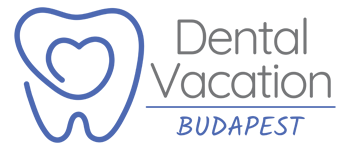Dear Patients,
Our post today is about what we should do if our child is suffering from tooth ache.
Unfortunately, toothache is a common problem in early childhood. In such an outstanding time we live in today, there is no chance for a proper examination. Making a statement therefore would be a mistake. However, it is likely that the pain is due to the decay of deciduous teeth or existing, permanent teeth.
Let’s take a quick look: generally speaking, tooth formation begins in the sixth month of a child’s life, and then the baby’s teeth break through between the age of one and a half and 2. The 20 baby teeth then begin to fall out around the age of 6 or 7 only to be replaced by permanent teeth. By the end of this process at the age of 12-14 children will ideally have 28 teeth all together. Wisdom teeth develop later, on the eve of adulthood.
As soon as the first teeth appear, your child’s teeth are vulnerable and may be damaged if not properly cared for. Simply put a tooth decay is practically a damage on the surface of the enamel, a hole in the tooth.
How can we prevent caries?
Getting rid of poor eating habits that includes too sugary or acidic soft drinks are highly effective. If this change in the children’s diet is coupled with good and regular oral hygiene, the early appearance of cavities can certainly be avoided. Genetic factors may as well contribute to the early appearance of caries, as some people have weaker enamels than others. In these cases, systematic and good dental care is even more important.
Early on, you must teach your child patiently the right oral hygiene, helping them learn the right technique. Of course, the first teeth must be looked after by the parents, but from the age of two you can start to involve the kids and brush your teeth together at least twice a day. Kids love to repeat, and setting a good example is the best you can do. Funny apps are already available to motivate the children. If your child is reluctant to brush their teeth, you can always try the ‘magic toothbrush’, an electric toothbrush designed specifically for kids. Make sure you choose the right toothbrush and toothpaste for your child’s age.
How do the cavities on my child’s teeth be detected?
If your child complains about toothache or you spot a discolouration on their teeth, or you may be feeling bad breath, ask your dentist for advice.
Typically, cavities are cleaned out and filled with special material. In such a peculiar situation dental treatment is only carried out if emergency occurs. Bacteria that breed on baby and child teeth can also endanger the germ of a permanent tooth, so an instant consultation is vital. It is important to note that the above proposals should never replace customized treatment and careful dental control. No matter what the situation is, we are here for you to offer a more personalized solution!








